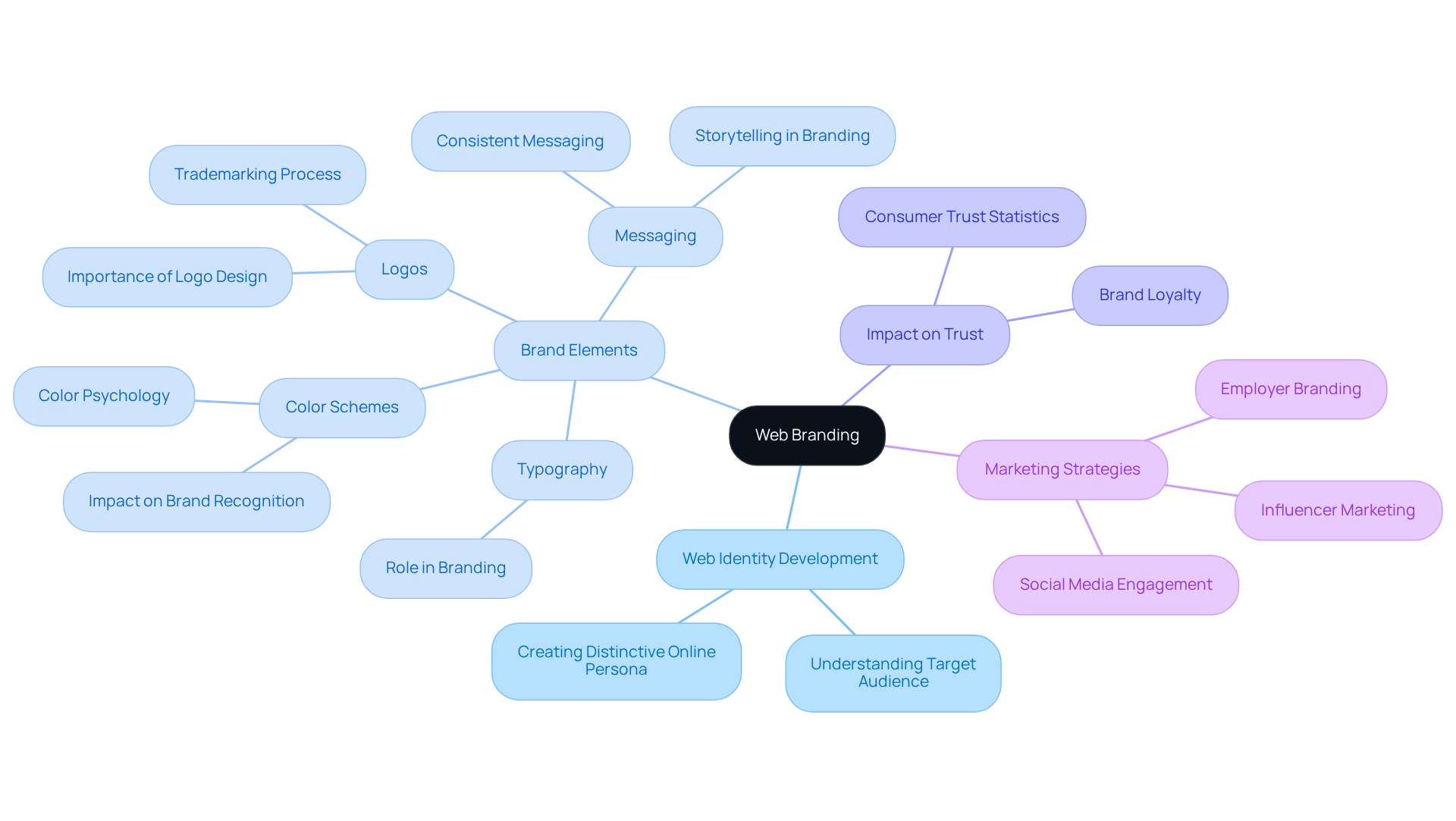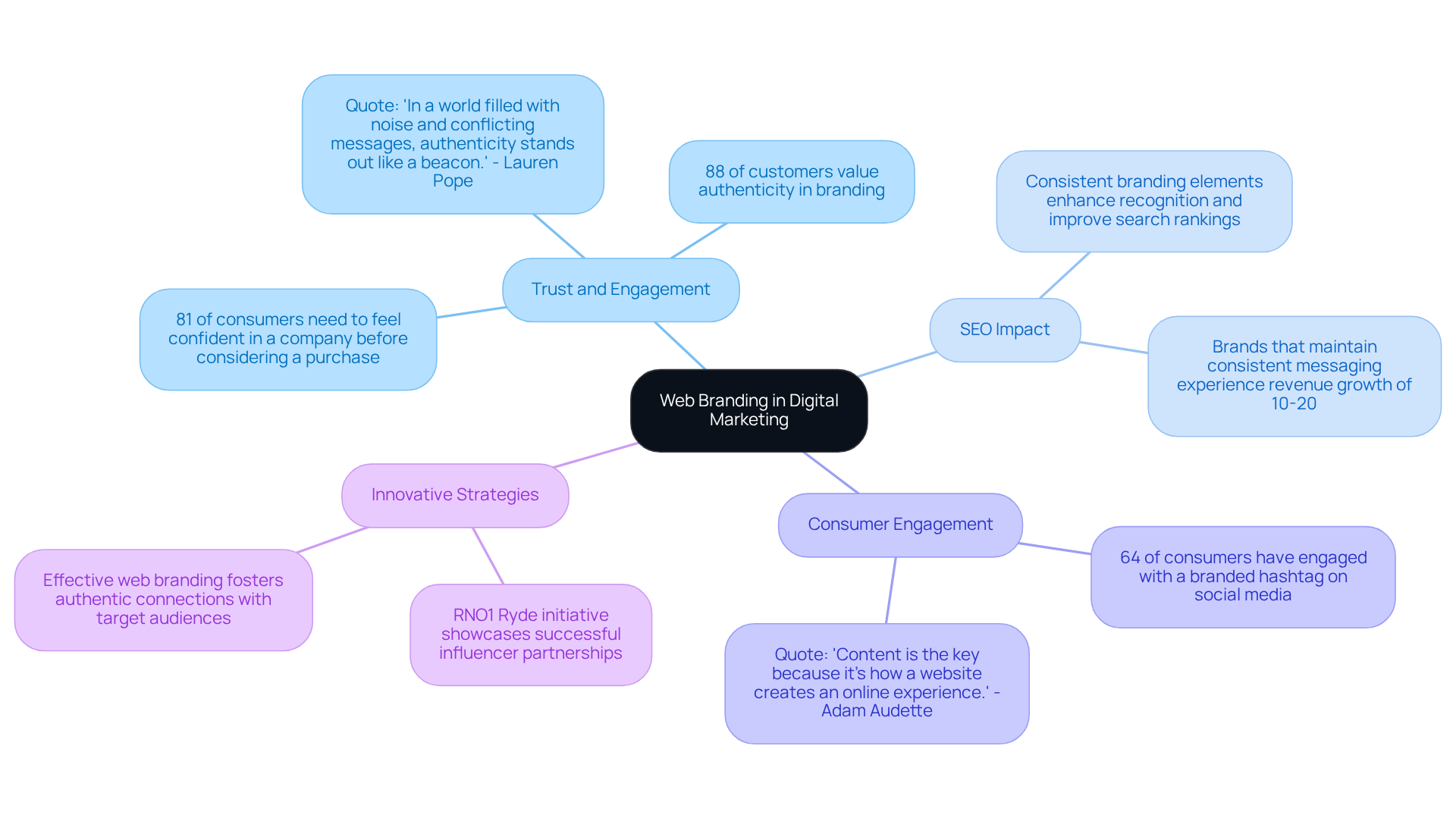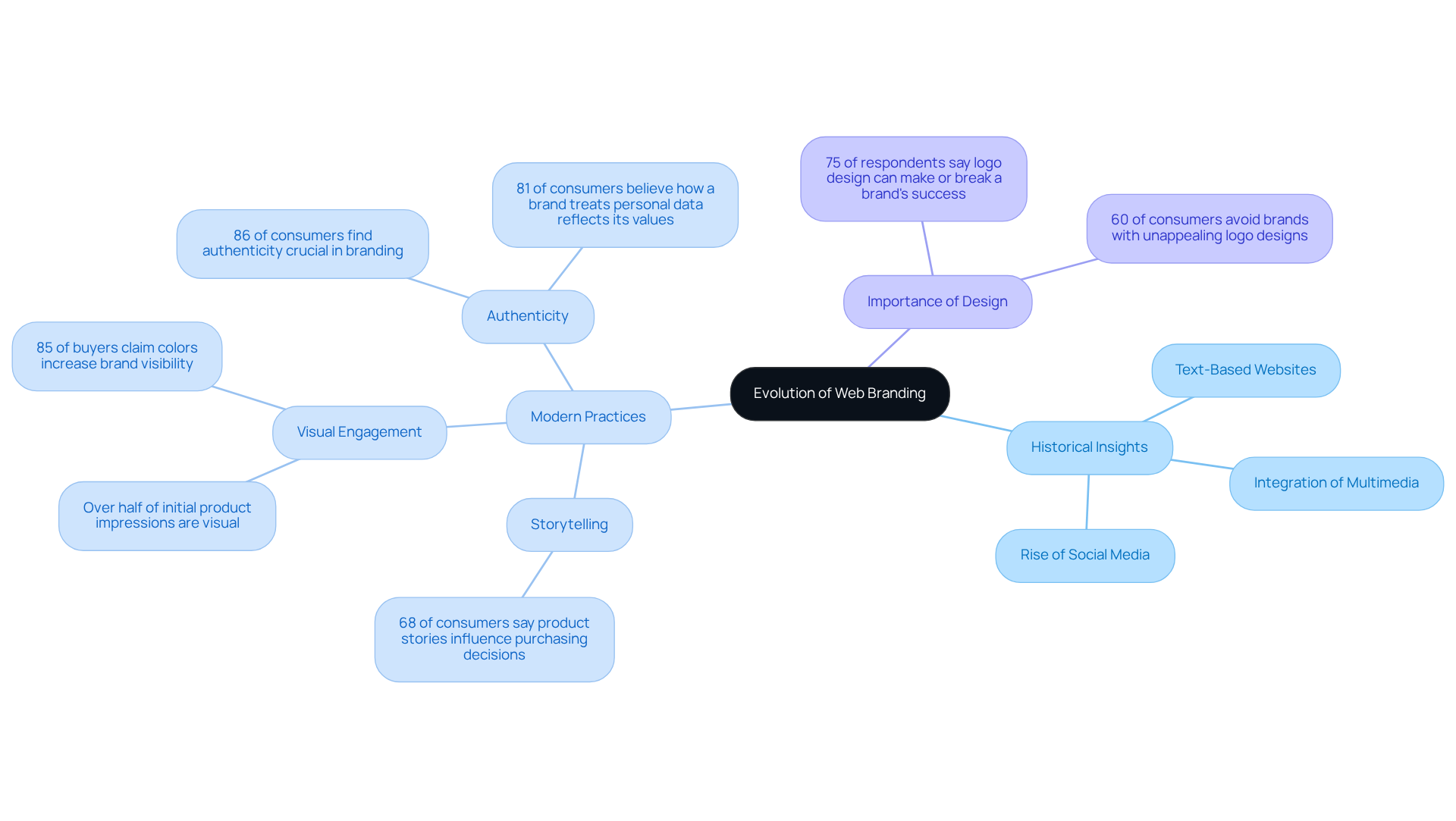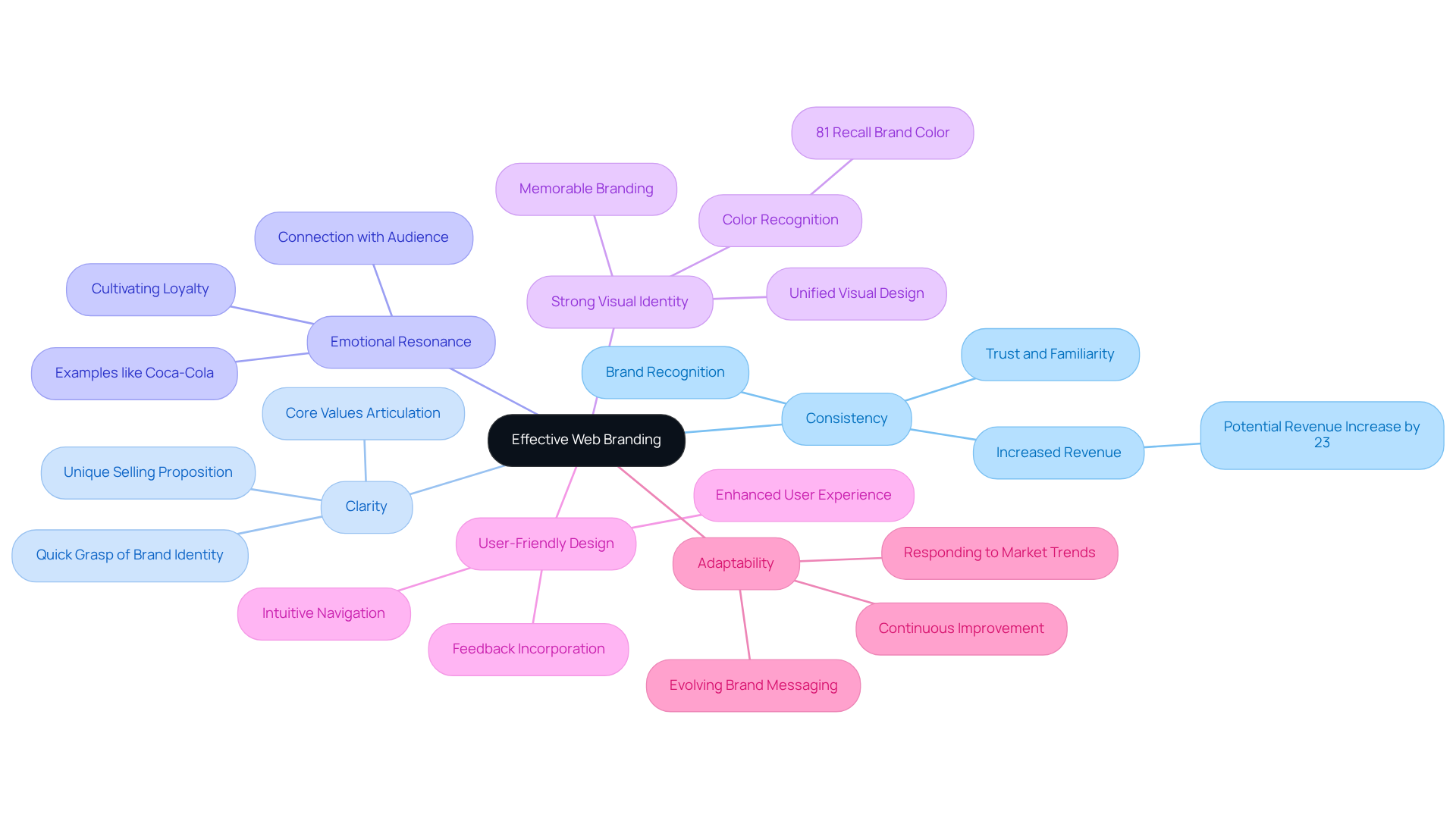Overview
Web branding presents a significant challenge for tech startups, as many struggle to establish a distinctive online identity. This issue can lead to a lack of trust and recognition among consumers, ultimately impacting their purchasing decisions. Imagine pouring your heart and soul into your innovative ideas, only to find that potential customers overlook your brand because it lacks a cohesive presence. This pain point resonates deeply with many founders who wish to connect authentically with their audience.
However, there's hope. By focusing on a cohesive web presence, startups can foster trust and recognition, paving the way for significant revenue growth. It’s essential to embrace consistency, clarity, and emotional resonance as cornerstones of effective branding strategies. By sharing your brand's story and values, you can create a genuine connection with your audience, inviting them to join you on your journey.
At RNO1, we understand the emotional and professional needs of tech startup founders. We are here to support you in building a brand that not only stands out but also resonates deeply with your audience. Together, we can transform your vision into a compelling online identity that inspires trust and drives purchasing decisions.
Introduction
Crafting a distinctive online identity is a significant challenge that many tech startups face in today’s saturated digital landscape. It’s not just about standing out; it’s about building trust and recognition among potential customers. This can feel overwhelming, especially with the myriad of choices and strategies available.
How can you ensure that your branding resonates authentically and meaningfully with your target audience? In this article, we will explore the essential components of web branding, its historical evolution, and its strategic importance. Our aim is to provide insights that empower you to thrive in the digital marketplace, nurturing your journey as you navigate these complexities.
Define Web Branding: Core Concepts and Relevance
Web identity development can feel overwhelming for many tech startup founders. Crafting a distinctive online persona—complete with visual elements, messaging, and user experience—is a strategic process that is crucial for resonating with target audiences. It’s understandable that establishing a memorable online presence is a top priority, as effective web branding incorporates essential elements like logos, color schemes, typography, and consistent messaging across online platforms. This unified identity not only sets a startup apart from its competitors but also fosters trust and recognition among prospective clients, making it an essential part of online marketing strategies.
At RNO1, we truly understand the challenges you face. That’s why we are deeply committed to design-driven solutions that maximize marketability through our Return On Design & Digital (RODD) strategies. Our collaborative work with Founder's Haven is a testament to this commitment, where we strategically rebranded the company to empower contemporary founders on their journey to online success. This transformation illustrates how impactful online marketing can enhance a company’s identity and market presence, providing hope and direction for startups.
Consider the successful examples of web branding that are prevalent in digital marketing. Apple’s minimalist design and consistent use of its iconic logo have significantly strengthened its identity, contributing to its status as the world’s most valuable company. Similarly, Nike’s narrative strategy, captured in its 'Just Do It' campaign, fosters emotional bonds that deepen loyalty to the brand. These stories remind us of the power of a strong online presence.
The effect of online presence on customer trust is profound; research shows that 81% of consumers need to trust a brand before considering a purchase. When startups focus on creating a uniform identity, they can see a 10-20% rise in revenue, underscoring the importance of a in promoting business success.
Drawing from the insights of marketing specialists, it becomes clear that understanding and connecting with your audience is vital for a successful online identity. As one specialist wisely noted, 'Ensure you fully understand who your target audience is before you start promoting your products and services to attract them.' This foundational knowledge empowers startups to tailor their marketing strategies effectively, fostering deeper connections with their customers. At RNO1, we leverage our performance marketing expertise to assist tech startups in expanding their eCommerce visibility, as highlighted in our case study with Cirkul. This experience showcases the transformative effect of strategic marketing, reinforcing our commitment to your success.

Contextualize Web Branding: Its Role in Digital Marketing
In the digital marketing landscape, establishing web branding can feel overwhelming for startup founders. This presence is crucial in , which directly influences how customers perceive the brand. A cohesive and appealing web branding fosters trust and engagement, which is essential for success. Research indicates that 81% of consumers need to feel confident in a company before considering a purchase, highlighting the importance of authenticity in marketing. As Lauren Pope wisely notes, "In a world filled with noise and conflicting messages, authenticity stands out like a beacon."
Moreover, an effective web branding strategy doesn’t just build trust; it also significantly impacts search engine optimization (SEO) efforts. Consistent branding elements enhance recognition and improve search rankings, making it easier for potential customers to find your company online. For tech startups, where standing out is vital, a robust online presence can lead to greater visibility and customer loyalty. In fact, brands that maintain consistent messaging across platforms often experience revenue growth of 10-20%. This connection between brand identity and web branding is essential, as it helps startups differentiate themselves in a competitive market, ultimately boosting traffic and nurturing lasting relationships with customers. As Arjun Basu aptly puts it, "Without strategy, content is just stuff, and the world has enough stuff."
Furthermore, it’s inspiring to see that 64% of consumers have engaged with a branded hashtag on social media, showcasing the power of marketing in fostering customer engagement and visibility. The RNO1 Ryde initiative serves as a beacon of hope, illustrating how innovative strategies for scaling omnichannel brand ambassador programs can enhance e-commerce engagement through influencer partnerships. This approach not only solidifies a startup's web branding in the digital realm but also fosters authentic connections with target audiences. Specific case studies from the Ryde initiative highlight its success in leveraging influencer partnerships to drive engagement and sales, ultimately supporting the journey of tech startups in crafting their unique identities.

Trace the Evolution of Web Branding: Historical Insights
The journey of web identity began in the early days of the internet, where websites were primarily text-based and often lacked visual appeal. This can feel frustrating for many tech startup founders who strive to make their mark in a crowded digital landscape. As technology advanced, the integration of graphic design and multimedia transformed web branding into a more dynamic and engaging experience, a shift that is crucial for attracting consumers.
The rise of social media platforms has further reshaped marketing strategies, allowing companies to connect directly with their audiences and build vibrant communities around their brands. In today’s digital world, web branding is not just about visuals; it also encompasses storytelling and emotional connections, reflecting the growing demand for authenticity and engagement.
It's striking to note that:
- 68% of consumers say product stories influence their purchasing decisions, underscoring the power of narrative in marketing.
- Over half of initial product impressions are visual, highlighting the critical role of design in capturing consumer attention.
This historical perspective emphasizes the need for tech startups to adapt their marketing strategies, particularly in web branding, to remain relevant and competitive. Notably, 51% of companies cite increasing visibility as their main reason for leveraging social media.
RNO1 exemplifies this evolution through its partnerships with various companies, like supporting RentMethod in its acquisition by Airbnb and collaborating with Spring Labs to create innovative online experiences. These case studies illustrate how RNO1's creative strategies and design-first approach empower modern companies to enhance their online presence and engage meaningfully with their audiences. Together, we can navigate this ever-changing landscape and find ways to .

Identify Key Characteristics of Effective Web Branding
For many tech startup founders, building an effective web branding can feel daunting. The challenge lies in ensuring consistency, clarity, and emotional resonance across digital platforms. When a brand's identity is consistent, it becomes easily recognizable, fostering among consumers. Think of iconic companies like Apple and Nike; their unified visual designs and communication create a sense of reliability that strengthens their market presence. This consistency is not just a design choice; it’s a foundation for building lasting relationships with your audience.
However, clarity in messaging is equally crucial. It allows potential customers to quickly grasp what your organization stands for and the value it brings. Startups that clearly articulate their core values and unique selling propositions are more likely to attract and retain customers. This clarity cuts through the noise and speaks directly to the hearts of your audience.
Emotional resonance also plays a pivotal role in forging connections. When a brand connects with its audience on an emotional level, it cultivates loyalty and engagement. Take Coca-Cola, for instance; their branding evokes feelings of happiness and nostalgia, illustrating how powerful emotional connections can be.
Additionally, a strong visual identity, user-friendly design, and the ability to adapt to changing market trends are essential characteristics of a compelling web presence. By prioritizing these elements, tech startups can achieve effective web branding that not only stands out in the digital marketplace but also resonates deeply with their target audience. This nurturing approach ultimately drives growth and success, creating a supportive environment where both the brand and its customers can thrive.

Conclusion
Crafting a strong web branding strategy can feel overwhelming for tech startups striving to find their unique voice in a crowded digital marketplace. Without a well-defined online identity—one that encompasses visual elements, messaging, and user experience—startups risk blending into the background, potentially losing out on the trust and recognition that are vital for attracting clients. The importance of web branding is profound; it forms the bedrock of effective marketing strategies and nurtures lasting relationships with target audiences.
As we explore the multifaceted role of web branding, it becomes clear how it drives customer engagement and trust. Effective branding strategies not only enhance visibility but also improve search engine optimization, ultimately leading to revenue growth. Consider the examples of industry leaders like Apple and Nike, whose cohesive branding underscores their success. Statistics further reveal that a consistent online presence can yield significant financial rewards. Moreover, understanding your target audience is essential; it allows startups to tailor messaging and create deeper connections that resonate.
In a world where authenticity and emotional resonance are paramount, tech startups must prioritize their web branding efforts to ensure they shine brightly. By embracing the core characteristics of effective branding—consistency, clarity, and emotional engagement—startups can forge strong relationships with their customers and encourage sustainable growth. Remember, the journey of web branding is continuous. As the digital landscape shifts, so too must your strategies. By embracing these principles, you can enhance your startup's online presence and empower it to flourish in an increasingly competitive market.
Frequently Asked Questions
What is web branding and why is it important for tech startups?
Web branding involves developing a distinctive online persona through visual elements, messaging, and user experience. It is crucial for resonating with target audiences, setting a startup apart from competitors, and fostering trust and recognition among prospective clients.
What are the essential elements of effective web branding?
Effective web branding includes logos, color schemes, typography, and consistent messaging across online platforms, which collectively create a unified identity.
How can a strong online presence impact a startup's success?
A strong online presence can lead to increased customer trust, as 81% of consumers need to trust a brand before considering a purchase. Additionally, startups that create a uniform identity can see a 10-20% rise in revenue.
Can you provide examples of successful web branding?
Yes, Apple’s minimalist design and consistent use of its iconic logo have strengthened its identity, while Nike’s 'Just Do It' campaign fosters emotional bonds and loyalty to the brand.
How does understanding the target audience contribute to web branding?
Understanding the target audience is vital for a successful online identity, as it allows startups to tailor their marketing strategies effectively, fostering deeper connections with customers.
What role does RNO1 play in assisting tech startups with web branding?
RNO1 is committed to design-driven solutions that maximize marketability through their Return On Design & Digital (RODD) strategies, helping tech startups expand their eCommerce visibility and enhance their online presence.




